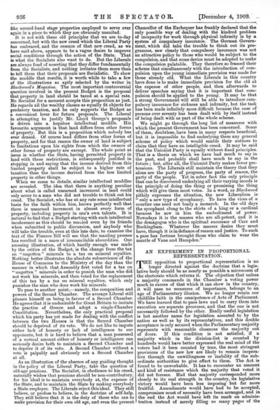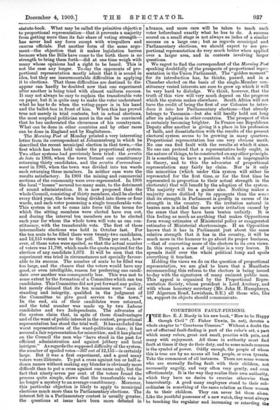AN EXPERIMENT IN PROPORTIONAL REPRESENTATION.
opposition to proportional representation is no longer directed against the doctrine that a legis- lative body should be as nearly as possible a microcosm of the electorate which returns it. The objection that unless a majority commands in the Chamber a voting power much in excess of that which it can show in the country, it will pass no measures of importance, belongs to an age of Parliamentary illusion. We no longer retain our childlike faith in the omnipotence of Acts of Parliament. We have learned that to pass laws and to carry them into execution are separate processes, and that the one is not necessarily followed by the other. Really useful legislation is but another name for legislation assented to by the nation as well as by its representatives, and this double acceptance is only secured when the Parliamentary majority represents with reasonable closeness the majority out of doors. If this condition is not satisfied, if a majority which in the division-list is counted by hundreds would have better expressed the real mind of the voters had it been counted by tens, the most stringent provisions of the new law are likely to remain inopera- tive through the unwillingness or inability of the sub- ordinate authorities to give effect to them. The Act is found to be unworkable. It has to encounter an amount and kind of resistance which the majority that voted it did not foresee. Had that majority corresponded more closely to its real strength in the country, its legislative victory would have been lesi imposing but far more fruitful. Amendments would have had to be accepted, compromises must of necessity have been arranged, and in the end the Act would have left its mark on adminis- tration instead of- merely filling so many pages of the statute-book. What may be called the primitive objecticn to proportional representation—that it prevents a majority from getting more than its fair share of voting strength— has never had any force except with wirepullers and caucus officials. But another form of the same argu- ment—the objection that it makes legislation barren because when the Bills have come to the birth there is no strength to bring them forth—did at one time weigh with many whose opinions had a right to be heard. This is not the case any longer. To-day the opponents of pro- portional representation mostly admit that it is sound in idea, but they see insurmountable difficulties in applying it to elections. That these difficulties are destined to dis- appear can hardly be doubted. now that one experiment after another is being tried with almost uniform success. It may not always be easy to explain the transferable vote on paper, but it is quite easy to make the voter understand what he has to do when the voting-paper is in his hand and the ballot-box in front of him. When this has proved true not merely in trial contests, but in actual elections, the most sceptical politician must in the end be convinced that he has underrated the cleverness of his countrymen. What can be done in other countries and by other races can be done in England and by Englishmen.
The Morning Post of Monday printed a very interesting letter from its correspondent at Johannesburg in which he described the recent municipal election in that town,—the first which has been held under the proportional system. Two other systems had previously been tried : the scrutin de lists in 1903, when the town formed one constituency returning thirty candidates, and the scrutin d'arrondisse- ment in 1905, when the town was divided into ten wards each returning three members. In neither case were the results satisfactory. In 1903 the mining and commercial sections of the community were over-represented. In 1905 the local "bosses" secured too many seats, to the detriment of sound administration. It is now proposed that the whole Council, consisting of thirty members, shall be elected every third year, the town being divided into three or four wards, and each voter possessing a single transferable vote. This system is not to come into force till the terms for which the sitting members were elected have run out, and during the interval ten members are to be elected each year for whom the whole town will vote as one con- stituency, with the transferable vote. The first of these intermediate elections was held in October last. For the ten seats to be filled there were twenty-two candidates, and 12,155 voters went to the poll. Three per cent., how- ever, of these votes were spoiled, so that-the actual number of voters was 11,788, which made the quota required for the election of any candidate 1,072. It will be seen that the experiment was tried in circumstances not specially favour- able to its success. The number of seats to be filled was too large, and the chance that the voters would have any good, or even intelligible, reason for preferring one candi- date over another was consequently less. This was met to some extent by the formation of a Committee which ran ten candidates. This Committee did not put forward any policy, but merely claimed that its ten nominees were " men of standing and integrity, qualified in the judgment of the Committee to give good service to the town." In the end, six of their candidates were returned, and the total number was made up by two Labour candidates and two Independents. The advocates of the system claim that, in spite of these disadvantages and of the want of public interest in the contest, proportional representation has stood the trial well. It has excluded the worst representatives of the ward-politician class ; it has secured a fair representation for minorities; and it has placed on the Council the men who "have stood in the past for efficient administration and against jobbery and local intrigue." As regards the supposed difficulty of the system, the number of spoiled votes-367 out of 12,155—is certainly large. But it was a first experiment, and a. good many voters were illiterate. To put a cross against ten or half-a- dozen names without making any blunder is obviously more difficult than to put a cross against one name only, but the fact that ninety-seven per cent. of the voters- found the process quite simple, shows that 'the transferable vote is no longer a mystery to an average constituency. Moreover, this particular objection is likely to apply to municipal elections much more than to Parliamentary elections. The interest felt in a Parliamentary contest is usually' greater, the questions at issue have been more debated in advance, and more care will be taken to teach each voter beforehand exactly what he has to do. A success scored on a small stage is not always an index of a similar success on a large one ; but as regards municipal and Parliamentary elections, we should expect to see pro- portional representation do very much better when applied over a larger area, and in contests involving larger questions. We regret to find the correspondent of the Morning Post speaking doubtfully of the prospects of proportional repre- sentation in the Union Parliament. The "golden moment" for its introduction has, he thinks, passed, and in a. Chamber elected on the basis of the single-Member con- stituency vested interests are sure to grow up which it will be very hard to dislodge. We think, however, that the truth of this view will very much depend on the progress which the system makes elsewhere. South Africa will not have the credit of being the first of our Colonies to intro- duce it into her Parliamentary elections—that already belongs to Tasmania—but she will hardly hold out long after its adoption in other countries. The prospect of this is certainly becoming brighter. In France one Republican Deputy after another is giving it a place in his profession of faith, and dissatisfaction with the results of the present electoral system seems to be growing in many quarters. Proportional representation has one very obvious merit. No one can find fault with the results at which it aims. No one can pretend that a representative body ought, in the nature of things, to be constructed on any other principle. It is something to have a position which is impregnable in theory, and to this the advocates of proportional representation may fairly lay claim. Nor is it only the minorities (which under this system will either be represented for the first time, or for the first time be represented in proportion to their actual strength in the electorate) that will benefit by the adoption of the system. The majority will be a gamer also. Nothing makes a majority more disliked by its opponents than the sense that its strength in Parliament is greatly in excess of its strength in the country. To the irritation natural- in beaten men is added the more acute irritation caused by the sense that they have been beaten unfairly. It is this feeling as much as anything that makes Oppositions form wrong estimates of Ministerial policy or exaggerated estimates of Ministerial shortcomings. If an Opposition knows that it has in Parliament just about the same relative strength that it has in the country, it will be much more in the humour to go about its proper business, —that of converting more of the electors to its own views. In this respect a sense of injustice is a very leaven. It spreads itself over the whole political lump and spoils everything it touches.
Holding the views we do on the question of proportional representation, we are glad to learn that a Manifesto recommending this reform to the electors is being issued to-day with the signatures of many eminent public men.
This appeal is organised by the Proportional Repre- sentation Society, whose president is Lord Avebury, and with whose honofary secretary (Mr. John H. Humphreys, 107 Algernon Road, Lewisham, S.E.) all those who, like us, support its objects should communicate.







































































 Previous page
Previous page